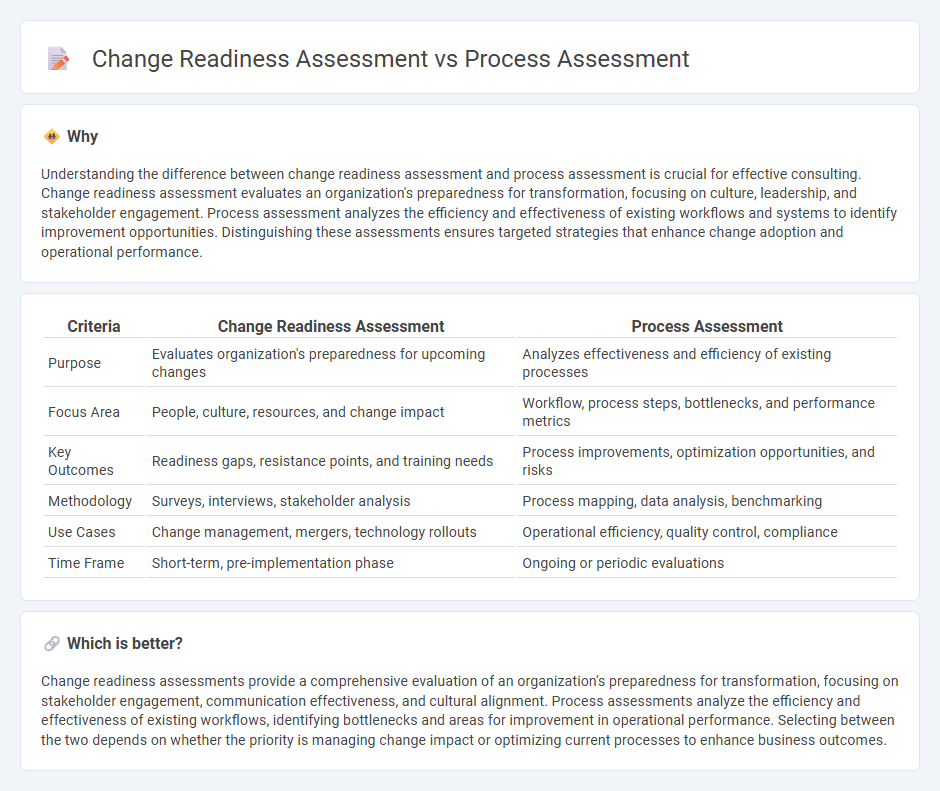
Change readiness assessment evaluates an organization's preparedness for upcoming transitions, focusing on employee mindset, resource availability, and potential resistance factors. Process assessment examines current workflows, identifying inefficiencies and opportunities for optimization to improve operational performance. Explore how integrating both assessments can enhance your consulting outcomes and drive successful transformation initiatives.
Why it is important
Understanding the difference between change readiness assessment and process assessment is crucial for effective consulting. Change readiness assessment evaluates an organization's preparedness for transformation, focusing on culture, leadership, and stakeholder engagement. Process assessment analyzes the efficiency and effectiveness of existing workflows and systems to identify improvement opportunities. Distinguishing these assessments ensures targeted strategies that enhance change adoption and operational performance.
Comparison Table
| Criteria | Change Readiness Assessment | Process Assessment |
|---|---|---|
| Purpose | Evaluates organization's preparedness for upcoming changes | Analyzes effectiveness and efficiency of existing processes |
| Focus Area | People, culture, resources, and change impact | Workflow, process steps, bottlenecks, and performance metrics |
| Key Outcomes | Readiness gaps, resistance points, and training needs | Process improvements, optimization opportunities, and risks |
| Methodology | Surveys, interviews, stakeholder analysis | Process mapping, data analysis, benchmarking |
| Use Cases | Change management, mergers, technology rollouts | Operational efficiency, quality control, compliance |
| Time Frame | Short-term, pre-implementation phase | Ongoing or periodic evaluations |
Which is better?
Change readiness assessments provide a comprehensive evaluation of an organization's preparedness for transformation, focusing on stakeholder engagement, communication effectiveness, and cultural alignment. Process assessments analyze the efficiency and effectiveness of existing workflows, identifying bottlenecks and areas for improvement in operational performance. Selecting between the two depends on whether the priority is managing change impact or optimizing current processes to enhance business outcomes.
Connection
Change readiness assessment evaluates an organization's capacity to adapt to upcoming changes by analyzing factors such as culture, employee engagement, and resource availability. Process assessment examines current workflows and operations to identify inefficiencies and areas for improvement. Together, these assessments provide a comprehensive understanding of organizational readiness by aligning change capabilities with process optimization strategies to ensure successful transformation initiatives.
Key Terms
Current State Analysis (Process Assessment)
Process assessment evaluates the efficiency, effectiveness, and compliance of existing workflows and procedures to identify bottlenecks and improvement opportunities within the current state. It involves detailed mapping, data collection, and performance metrics analysis to provide a clear understanding of process capabilities and gaps. Explore further to discover how integrating process assessment enhances organizational transformation success.
Organizational Culture (Change Readiness Assessment)
Organizational culture in change readiness assessments evaluates employee beliefs, values, and behaviors to determine how well a company can adapt to change, contrasting with process assessments that focus on workflow efficiencies and operational performance. Change readiness assessments identify cultural resistance and engagement levels, critical for successful transformation initiatives. Explore deeper insights into how cultural dynamics influence change readiness and drive sustainable organizational success.
Stakeholder Engagement (Both)
Process assessment evaluates the efficiency and effectiveness of workflow interactions and collaboration among stakeholders to identify bottlenecks and areas for improvement. Change readiness assessment measures stakeholders' willingness, attitudes, and preparedness to engage with and support upcoming organizational changes. Discover more insights on optimizing stakeholder engagement for successful transformation initiatives.
Source and External Links
Process Assessment - What Is It & Why Do You Need It? - Process assessment is a systematic evaluation of an organization's processes to identify strengths, weaknesses, and areas for improvement, focusing on effectiveness, efficiency, and alignment with goals, to reveal bottlenecks and boost performance.
Process Evaluation | IT Process Wiki - the ITIL(r) Wiki - ITIL process evaluation includes regular reviews, benchmarking, maturity assessments, and audits to identify areas where processes fail to meet targets and to support continual improvement.
How Operational and Process Assessments Fix Business Problems - Process assessments identify workflow inefficiencies and bottlenecks to streamline operations, improve communication, and enhance customer experience, tailored to the complexity and scope of the organization's processes.
 dowidth.com
dowidth.com